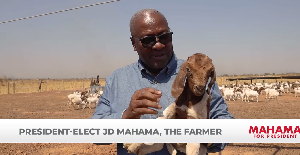Five years after the Bank of Ghana (BOG) closed down eight rural banks in the Western Region, over 500 customers are still counting their costs.
The depositors, mainly farmers and traders, are still struggling to retrieve over ?970 million deposits which have been transferred to a special account at BOG.
All efforts by some of the depositors to make BOG release the deposits have proved futile and though some of them had dragged BOG to the Commission on Human Rights and Administrative Justice (CHRAJ), it has still failed to release their deposits because the bank said official liquidators were yet to be appointed.
The Chronicle gathered that most of the depositors had been wallowing in poverty since all their lifetime savings were locked up at BOG.
Whiles some of the savers have died, others said they could not afford transportation to Accra to check whether the money had been released while yet others said they were fed up with the consistent postponement by officials of BoG.
Initially, the depositors were asked by BOG to contact the chairman and directors of the erstwhile banks for the refund of all or part of their deposits. However, they could not locate the directors since they were nowhere to be found.
In 1996, eight rural banks, including Kwakwadum Rural Bank, became distressed and were unable to meet the day-to-day withdrawal requirements of their depositors and creditors. BoG, therefore, instituted a number of remedial measures to resuscitate the banks. Chronicle gathered that some of the measures included embargo on lending and capital expenditures as well as vigorous loans recovery and deposit mobilization programmes.
The measures were tailored to ensure operational turn around of all such distressed banks, but only three banks could be turned around; the rest having deteriorated beyond recovery.
When the measures did not work for the distressed banks, BOG decided to withdraw the licenses of the affected rural banks in 1999 and their doors physically closed to the general public.
In a response to Chronicle's questionnaire, the Head of Banking Supervision Department of BoG, Mr. Frederick France noted that the financial indicators used to close the banks included the banks' inability to raise their capital adequacy ratio to the minimum level of 6% as statutorily required and that they had insufficient assets to cover their liabilities and were continuously operating at losses.
He said when the liabilities of a bank, which is registered under the Companies Code as a limited liability company, become more than its assets, the banking law spells out a number of measures to be undertaken to wind up the affairs of the company. These would involve gathering all assets of the company and distributing them to the various creditors making claims in the liquidation.
Mr. France said the depositors would be repaid when an application had been made to the courts for liquidation of the banks and liquidators had subsequently been appointed.
He said the bank was in the process of appointing liquidators to finalize the winding up of all the affected rural banks to facilitate prompt response to all claimants, including the depositors.
Last year, one Madam Rose Tabuah who was operating a current account with the Sefwi Dwinase agency of the Kwakwaduam Rural Bank, petitioned CHRAJ for guidance and specific directions.
In her petition, she noted that when the bank was closed down, she had a credit balance of ?630,000 standing in her account.
She said she had stayed calm in the hope that the bank would re-open soon, until she discovered that it would not operate anymore.
She lamented that thieves broke into her shop and made away with 50 pieces of wax prints, which had crippled her financially.
Click to view details



Business News of Wednesday, 10 November 2004
Source: Chronicle
















